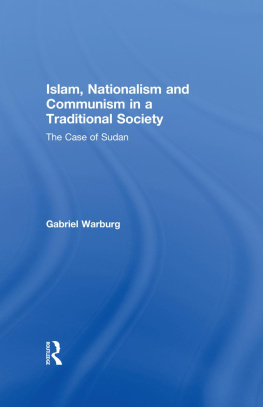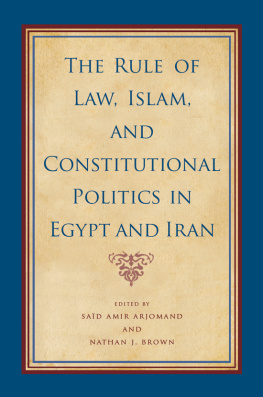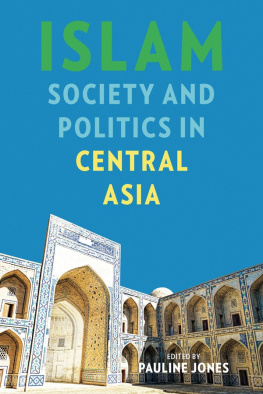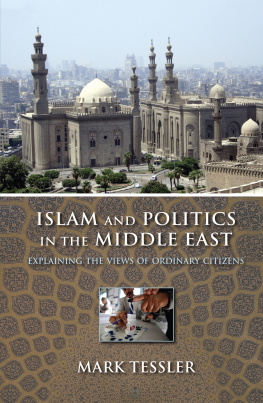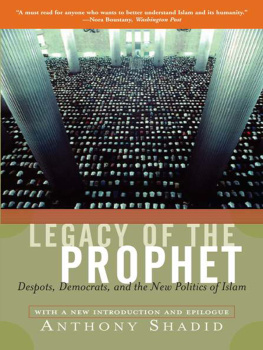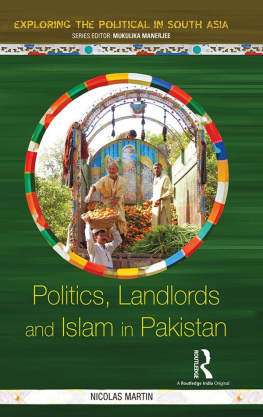ROUTLEDGE LIBRARY EDITIONS:
POLITICS OF ISLAM
ISLAM AND THE POLITICS OF
MEANING IN PALESTINIAN
NATIONALISM
ISLAM AND THE POLITICS OF
MEANING IN PALESTINIAN
NATIONALISM
NELS JOHNSON
Volume 4
First published 1982
This edition first published in 2013
by Routledge
2 Park Square, Milton Park, Abingdon, Oxon, OX14 4RN
Simultaneously published in the USA and Canada
by Routledge
711 Third Avenue, New York, NY 10017
Routledge is an imprint of the Taylor & Francis Group, an informa business
1982 Nels Johnson
All rights reserved. No part of this book may be reprinted or reproduced or utilised in any form or by any electronic, mechanical, or other means, now known or hereafter invented, including photocopying and recording, or in any information storage or retrieval system, without permission in writing from the publishers.
Trademark notice: Product or corporate names may be trademarks or registered trademarks, and are used only for identification and explanation without intent to infringe.
British Library Cataloguing in Publication Data
A catalogue record for this book is available from the British Library
ISBN: 978-0-415-64437-2 (Set)
eISBN: 978-0-203-07906-5 (Set)
ISBN: 978-0-415-83076-8 (Volume 4)
eISBN: 978-0-203-38140-3 (Volume 4)
Publisher's Note The publisher has gone to great lengths to ensure the quality of this reprint but points out that some imperfections in the original copies may be apparent.
Disclaimer The publisher has made every effort to trace copyright holders and would welcome correspondence from those they have been unable to trace.
Islam and
the politics of
meaning in
Palestinian
nationalism
ISLAM AND
THE POLITICS OF
MEANING IN
PALESTINIAN
NATIONALISM
Nels Johnson
KEGAN PAUL INTERNATIONAL
London, Boston and Melbourne
First published in 1982
by Kengan Paul International Ltd
39 Store Street,
London WC1E 7DD,
9 Park Street,
Boston, Mass. 02108, USA and
296 Beaconsfield Parade, Middle Park
Melbourne, 3206, Australia
Printed in Great Britain by
The Thetford Press Ltd, Norfolk
Nels Johnson 1982
No part of this book may be reproduced in any form without permission from the publisher, except for the quotation of brief passages in criticism
Johnson, Nels.
Islam and the politics of meaning in
Palestinian nationalism.
Bibliograhy: p.
Includes index.
1. Islam and politics Palestine, 2, Pales-
tinian Arabs Politics and government, 3. National-
ism Palestine, 4. Nationalism Religious aspects
Islam. I. Title.
BP63.I8J63 1982 306. 60899275694 82-12460
ISBN: 0-7103-0021-2
CONTENTS
Arabic transliteration is always a problem, and I have chosen a simplified system out of the large number of possibilities used today. The Arabic hamzah is represented by an apostrophe ('): the cAyn by a raised, lower-case letter, c (e.g. cUthmn). Dots are placed under the appropriate letters to represent the Arabic emphatics: . An Arabic word commonly used in English is not italicized.
A large number of friends and colleagues contributed to this book through their encouragement and comments. I would especially like to thank Raymond Baker, Barbara Harlow, David Konstan, Jrme Rousseau and Bruce Trigger for their long-term support of my work.
Individual chapters greatly benefited from critical readings by Jane Bishop, Martin Dolan, Mark Kennedy, Ann Lesch, Archie Mafeje, cAbd al-Wahhb al-Messiri, Cynthia Nelson, Jayme Spencer and Stefan Sperl. I greatly appreciate their time and suggestions.
An earlier draft of part of this material was made possible by a doctoral fellowship from the Canada Council. The American University in Cairo provided a research grant to conduct archival study in the Public Record Office in London. I am indebted to both institutions.
I would like to thank Mahmud Darwsh for permission to quote his poems in .
We are only cUthmn's Shirt. After the Caliph cUthmn was murdered, leaders would say I do this in the name of cUthmn when they wanted people to believe them. They only used his name. They waved his bloody shirt. Today, we Palestinians are cUthmn's Shirt.
I
The intention of this essay is to explore the relationship between an ideological idiom and the changing social movement in which it operates. The basic question is that of what roles an Islamic symbol complex played in different phases of the Palestinian nationalist movement, and what were the socio-economic factors which help to explain, and are themselves partially explained by, the appearance of these roles. Islam was ideologically appropriate at different stages in the development of the movement, and the study to follow will ask: in what ways and why?
The aims of this study are more social-scientific than historical, to use disciplinary boundaries which are hazy at best. I am interested here in discerning socio-cultural patterns which might be extended as generalizations to other cases, rather than in presenting a narrative of particular events. The latter, of course, is inevitable and necessary in a study of this kind, but for Palestinian history such a narrative has been done well and often enough to make another complete re-telling redundant. Rather, I shall re-work the historical material in order to abstract certain socio-cultural patterns; cutting into the narrative ground from a slightly different angle, and in such a way as to expose the relevant layers of events and relationships. The perspective from which I view this material is largely that of social anthropology, and the assumptions from which I am working will shortly be described in detail.
A word of clarification first: Palestinian political culture is a highly complex one, even by the standards of a region where such phenomena are notably defiant of neat analyses. Through time, in the face of British imperialism, Zionist settlement and finally expulsion from homeland, many elements have made up the ideological weave of the Palestinian movement: ethnicity, Arabism, Christianity, Marxism, anti-imperialism, Islam, and so forth. All have been important, but as with most social movements, none may be said to be the quintessential characteristic down to which it can be reduced.
Such a reductionism, then, was definitely not implied in my decision to focus on the role of Islam in Palestinian nationalism. The choice was made because this ideational element provides an especially illuminating vehicle for the examination of theoretical matters in the study of social movements and political culture. The focus was not dictated by a misguided notion that Palestinian political culture can best be understood in terms of Islam or any other single element. Palestinian nationalism is doggedly non-sectarian in its aims. None-the-less, the politics of ideology of social meaning has taken its vocabulary from many modes of discourse, including Islam, and the scrutiny of that particular symbolic form happens to be suited to the enquiry I have in mind.


